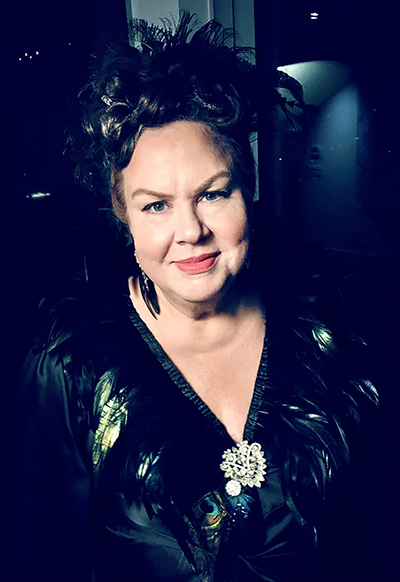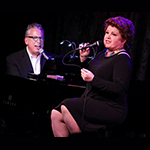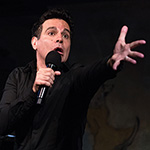Laural Meade
Ms. Tucker Will See You Now
The Gardenia, West Hollywood, CA, March 31, 2023
Reviewed by Elliot Zwiebach

Laural Meade let loose her inner Sophie Tucker and charmed a sold-out, enthusiastic audience in a show saluting the singer she called “one of the greatest women entertainers of the first half of the 20th century.” Rather than focus solely on a straightforward overview of Tucker’s life and music, Meade smoothly interspersed bits of biography with reflections on the cultural impact Tucker has had on women’s rights and feminism.
Meade did not attempt to imitate Tucker’s voice, though she did perform the songs in Tucker’s speak-singing, belting style, with strong piano support from Steven Argila (who occasionally traded barbs with Meade’s Tucker in the role of Ted Shapiro, Tucker’s accompanist for 40 years).
One of the evening’s most fascinating moments came when Meade recreated Tucker’s theme song, “Some of These Days” (Shelton Brooks), as Tucker had sung it in 1911, including a verse that sets up the song as a lament by a young Irish lass for her departing laddie. It’s a version the younger Tucker sang with an unexpected lilt in a higher-pitched, more staccato style than her later norm. Meade immediately followed that version with a more energetic, full-throated rendition, the way Tucker sang it in the 1930s, and she used the song again as a closer with an audience singalong.
Meade is a powerful singer who restrained her innate abilities to mimic Tucker’s style, with the exception of her next-to-closing number, “The Man I Love” (George and Ira Gershwin), which she sang in her own thrilling voice, resulting in a plaintive, heartfelt performance that was abetted by a strong, dramatic piano solo from Argila. It was a version intended, Meade said, to illustrate her belief that although most of Tucker’s songs dealt with her sexual prowess and romantic dalliances, she probably yearned for a more lasting, loving relationship than she ever found.
Regarding Tucker’s cultural influence, Meade told jokes delivered over the years by a variety of women who have cited Tucker as an inspiration, including Belle Barth, Joan Rivers, Phyllis Diller, Pearl Williams and, of course, Bette Midler.
According to Meade, Tucker was one of the first women to work “blue,” as she demonstrated in several sassy, raunchy songs that relied heavily on double entendres, including her delightful opening number, “No One But the Right Man (Can Do Me Wrong)” (composers unknown), and “Last of the Red Hot Mamas” (Jack Yellen/Milton Ager). She also offered up “My Husband’s in the City” (S.
R. Henry), about a woman’s dalliances during the week while she’s alone as well as a down-and-dirty “Cheatin’ on Me” (Yellen/Lew Pollock).
She recalled Tucker’s way of dealing with her weight issues in a reflective “Nobody Loves a Fat Girl” (the only lyric Tucker wrote, Meade noted, with music by Shapiro), exchanged repartee with Argila on “I Don’t Want to Get Thin” (Yellen/Ager), and performed the light-hearted “Middle-Age Mambo” (Eddy McKean), a stay-seated dance number that involved simply waving one hand, shaking the fingers of the other hand, and poking her neck forward.
Meade also performed a beautifully acted English-language version of “My Yiddishe Momme” (Yellen/Pollock) and demonstrated Tucker’s feminist attitude in the amusing “I’m Living Alone (and I Like It)” (Yellen/Dan Dougherty).





